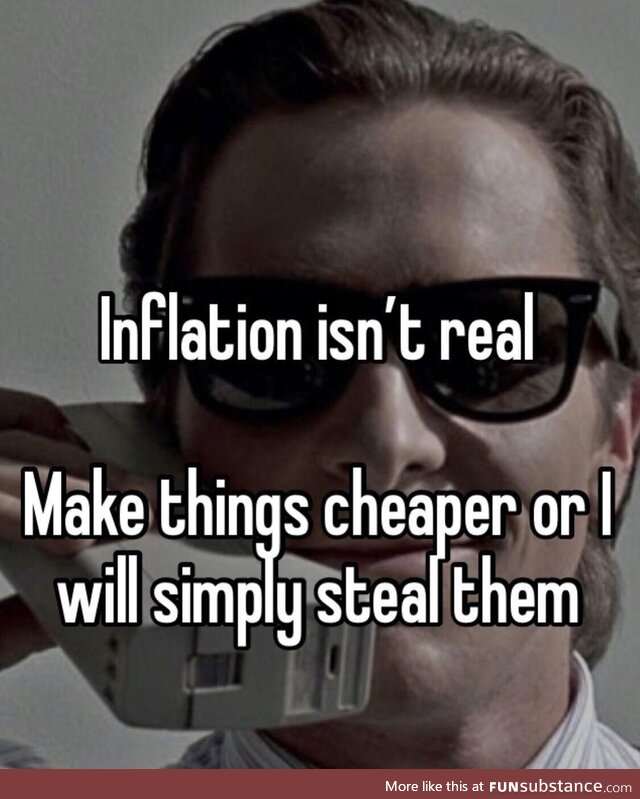Featured Posts

I wish I had a fort

The powerof positive thinking

NASA

Pray for Australia

Take care of each other

She has emerged

My soul feels so much better

I just ordered one. #Just2019HispanicThings

He really wanted his photo at the Halloween party, but was super scared of the spiders

The Only Thing More Contagious Than COVID19 Might Be This Fox's Smile
About
FAQ
Contact
Rules
Terms
Privacy
Feedback
Keyboard Shortcuts:
Previous Post · Next Post · + CTRL Skip Post
Previous Post · Next Post · + CTRL Skip Post
© 2025 FunSubstance · funny and entertaining pictures, memes, gifs & videos.



That said this is actually quite brilliant.
Economics reflects behaviors right? We are just describing the way people think and act in different situations concerning commerce.
Part of that can be said to be nature or instinct expressed through our thoughts and actions- but a larger component is social.
If you had a group of people who’s fundamental thought processes differed from our own or their culture significantly differed, their values and morals- our concepts of economics, many of them, fall apart.
So yes in fact. Theft is a way to change the system if economics. It’s speculative, but in a society where what we know as theft is normalized and even perhaps not criminalized or stigmatized- the face of commerce changes greatly.
Of course even within our own system theft is in theory a valid form of market pressure.
Mass theft can show that there is demand for a product but that the product is not priced to the market. This CAN lead to repricing or other relief, or it can lead to products no longer being available because their total cost to put to market exceeds the price people will pay. That isn’t always a bad thing of course. The ability to create “artificial demand” has been honed to a fine science and digital assets have opened new doors for that. Artificial scarcity and the ability to restrict or prevent product usage after purchase easily or force “subscriptions” and such for example.
The power relationship requires that those being ruled submit to those in power. Modern democratic systems tend to favor attempting to avoid direct physical force or intimidation to coerce compliance.
The penalties for breaking the rules that empower those in power coupled with human social behaviors and rewards/punishments that take advantage if those social behaviors, will usually keep most people doing what the powerful require and desire for their benefit, and then some smaller benefit or illusion of benefit is provided to the masses to encourage further compliance.
The first option is to use mass punishment to instill fear and obedience-this is problematic. In the modern age such measures often backfire against those in power and in a democracy where the people play some part or believe they play a part in selecting leaders, mass retribution against the public is generally unwise to keep power. You are likely to become unpopular in their view and lose support, which if you are actually elected can cost you your power, and if you are there by illusion of election you’d still lose your power because maintaining that illusion of choice when the general public hated you for mass punishments would break all illusions that their voices mattered.
This works with crime as well. Most people don’t care if you make it a crime to renegotiate a bond if that bond is worth greater than your total losses Yoy and the bond is not within 2 years of maturity and you are not a 401c. Because that’s gibberish anyway but most people would buy it because most people have little stake in those things.
No one cares if it isn’t something they do and they don’t know anyone who does it.
Your average American doesn’t care about how various vehicle laws impact the enjoyment of millions of car enthusiasts because to most people a car is an appliance and not a hobby or interesting machine to tinker with or form of expression. Most people are perhaps even happy when a law passes that they feel will reduce the loud cars they have to hear or the tacky machines they see on the road or parked in the driveway across from them etc.
It’s hard to convince people that they themselves are criminals or their little old granny or nice coworker is let alone that ALL of them are.
So the other option when something gets so pervasive is…
Give in. If you say something is illegal but enough people do it, your authority is meaningless. People aren’t listening. So you say it is legal and then you can claim people are doing it by your authority. Being the one to make something accesible that people like is usually good for your popularity and gives the appearance that you are working for those peoples interests when in fact you were simply powerless to stop it so had to either choose to fight a losing fight or give in to what people were already doing.
Skillful persons in power often turn these sorts of things into ways to make money- an example might be that theft was decriminalized under certain circumstances but then it became legally required or compulsory to have theft insurance, driving private industry, and a new tax system might be put in place to tax Stollen goods, which would then be taxed again if they were sold.
By using taxes to make the money back, the criminal act can be balled up into the customary understanding that taxes are a
Fundamental.
Of course ownership isn’t real either, it’s a concept. Most things concerning human behavior “aren’t real” but are just how we describe and attempt to understand and navigate interactions between people.